Four international shipbuilding firms and a consortium of British firms have been selected to complete for Fleet Solid Support ship work.
The British consortium is made up of Babcock, BAE Systems, Cammell Laird and Rolls-Royce.
The four foreign firms are Italian firm Fincantieri, Spanish company Navantia, Japan Marine United Corporation, and Daewoo Shipbuilding and Marine Engineering of South Korea.
Defence Minister Stuart Andrew said:
“The widespread interest in this competition shows that our Royal Navy and Royal Fleet Auxiliary remain among the most prestigious in the world.
These support ships will be vital for supporting our formidable Queen Elizabeth Class carriers and will ensure our warships can deploy in a range of challenging environments and across huge distances, wherever they are in the world.”
According to a statement from the Ministry of Defence:
“The Fleet Solid Support ships, up to three of which will be procured through international competition as they are not warships, will be fitted with specialist and classified equipment at a British shipyard before entering service with the Royal Fleet Auxiliary from 2026.”
However, many argue that the claim “they are not warships” is arbitrary, more on that later.
Shipyards across the United Kingdom will be able to bid for this work in 2022.
The Government’s procurement plans are facing opposition from defence analysts, Labour, the SNP, trade unions and many others.
A briefing paper in the House of Commons library states:
“The Government intends to compete the contract internationally. Labour, the SNP and the shipbuilding trade unions argue the contract should be restricted to UK shipyards to support the shipbuilding industry, secure jobs and retain skills. They argue the proposed ships are ‘warships’ and as such, the Government can use the Article 346 exemption to exclude the contract from EU procurement rules on national security grounds.”
The TUC has also assessed the Article 346 exemption argument and argues the Government “has the sole right to determine” what its essential national security interests are. The TUC claims “other European nations have used the exemption to place orders for similar support ships with their own shipyards since the Directive was introduced.”
Paul Sweeney, MP for Glasgow North East, discussed issues surrounded the National Shipbuilding Strategy during a recent debate on UK sovereign capability in Parliament where he responded to remarks that only ‘complex warships’ should be built in the UK by pointing out that the construction of auxiliary vessels has allowed the UK to retain the skills to build complex warships and after citing the example of RFA Wave Ruler and more recently the five River class ships being built on the Clyde to sustain the workforce at the yard, he said:
“By utilising those less complex nut nonetheless complex warships, by smoothing that build cycle, we retain the skills, we maintain the infrastructure, we retain the critical mass to build to build the complex warships which includes frigates, destroyers and aircraft carriers.
We have to look beyond that arbitrary restriction and maximise the purchasing power of the Ministry of Defence to deliver UK sovereign capability.”
Paul also explained that building the new Royal Fleet Auxiliary Fleet Solid Support ships and then the successor to the Albion class in Rosyth would be of huge benefit to UK shipbuilding and allow for at least four primary shipbuilding sites.



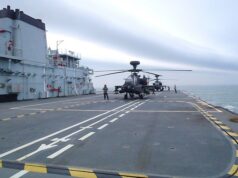

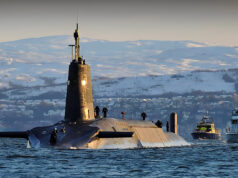
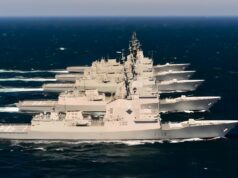

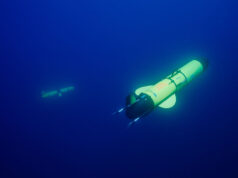
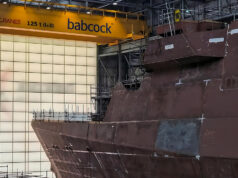


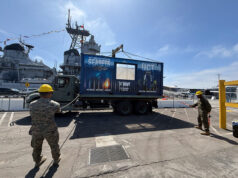

It’s a tricky one, whilst we need to support UK shipyards and keep the skills the lack of competition means the big players can ramp the price up if left UK only.
On a further note are any of our military industries truly British anymore?
This is going to be interesting but I hope if nothing else it will put to rest the argument as to who can compete for what.
Brom… your second line. Yes nearly all of them or in partnership with others.
They have systematically made sure our other heavy industries are foreign though (car making, train making, steel making, etc., etc.). Indeed, it has happened to such an extent that it is very obviously deliberate. Meanwhile France, Germany, Italy, Japan, have most certainly not done this to anything like the same extent.
Steve you never owned a Maxi or a Mini Metro 🙂 there was nothing deliberate more head in the sand arrogance that we were building good cars.
1970s. Irrelevant. Move on!
The big UK players would be silly as the MOD and NAO have pretty good ways of estimating the price to build a ship.
That’s an old idea. Some say you need one source so they can build in numbers to make it more cost effective to build and competition makes things worse so who is right and what is the right formula?. The Sir John Parker report says about having a price and design and sticking to it, not changing speck and so on. In this digital day and age, the MOD should be able to estimate the price themselves and tell if a firm is taking the piss.
Tell me why that OPV cost more.
At the same time, the MOD needs to realize that UK firms are not on a level playing field with the foreign firms and any price given by the foreign firms need to be not just a little lower, but lower by the amount of tax clawback direct and indirect (minus 30% to up to 50% some say to give Net) then another 50% less as was made up by an MOD spokesman regarding the Tides and UK firms, even though it was also said no UK firms bid on them.
Do we actually know anything more about the spec? I’ve seen 40,000t or thereabouts thrown around but is there some minimum core spec issued yet or is that based on some “the Tides are 39,000t so these will probably be about the same” type of guesswork?
I’d love to see a core spec similar to the one issued for T31e that actually specified some constraints on minimum number of flight deck spots, minimum hangar capacity, minimum volume of storage spaces, possible provision for hospital facilities either in the core spec or as an optional/configurable add-on, etc.
I’m suprised BMT was not part of the consortium. Where the Tides not a BMT design, I thought the plan was to utilise the same hull design.
For me a big problem is if this contract does go overseas when it comes to building a large vessel that is classed as military ie Albion replacement they will cost far more because we won’t have the infrastructure left for it. The Tides went overseas because we did not have the capacity at the time to build them, now we do, so by going over seas we will save short term but spend more in the long term when it comes to future ships.
No, not lack of capacity. UK firms were given the cold shoulder.
Not often I agree with Labour and SNP but on this I do. All our military ships, regardless of role, should be built here in the UK. Sustains jobs and the industry as a whole. Also means that we have the capacity to build more for foreign military customers as well. If we lose those capabilities then they’re gone forever.
The government needs to realise that naval shipbuilding isn’t just carriers, frigates and destroyers, and submarines.
I’m expecting at least one of the Wave class tankers to be sold to Brazil, if so it will be interesting to see how much its depreciated relative to what the UK paid for it. The RN orders so few large ships now we pretty much need to operate them for 10-15 years if it allows us to sell them on a reasonable price that allows us to keep the order book for new ships flowing and costs for refits and servicing down.
Projects such as these should be costed on net, monetised value to the UK.
Price is important, but if one bid is 20% less than another but returns next to no value to the UK, tax, development, UK supply chain etc. then I would argue it is a more expensive solution.
Money is a commodity, its price changes with supply and demand. So if raw price is subject to psychology and interpretation, then surely there’s no good reason to exclude other measures in determining the cost of something.
Nath-good post. When a company contracts work to another contractor apart from net mark-up it gives away the gross profit or contribution at the same time. So, if a UK contractor can do the work for somewhere between its net cost of direct labour and materials, and the contract price awarded to an overseas Contractor then the contribution to overheads remains in the UK. There is often a case to take a gross profit even though there may be a negative net, especially during a recession to bleed more slowly(!) until times get better, and as you said above Nath-there are other considerations, for example using infrastructure that might otherwise remain idle.
Good yet rarely made points Nath. Money is not the only consideration for the national interest. The problem is our ship building base has shrunk by design and so competitive forces are just not there to exploit. Tendering for rail franchises has proved that private companies will bale out of they cannot make it pay. We might be left with unfinished ships on slipways if MoD insists on fixed price contracts (c.f. Astute class). Another issue seems to be the too many cooks syndrome and late chances to designs that pushes up costs. Personally, unless the U.K. gets back into this industry we as a country will have to become ever more reliant on others. Not a solution I like.
Then we are no longer a maritime power and should forget it.
I agree with this. If a UK-built ship/plane etc is more expensive, the government should look at how much of that will go into staff pay, of which 20% comes back in tax, how much of their remaining money will be spwnt in local economy and recycled back to the treasury via VAT, how much corporation tax will be paid etc.
I suspect this isn’t done because that money, whilst going to the treasury, is little benefit to the MoD who see no return on that.
That’s the problem, its about immediate cost and that’s it; little thought given to our indigenous defence industries. It’s like the new Apaches being bought off the shelf rather than licence built here at home.
If a foreign design is better for MoD needs then fine, but the MoD should fight for them to be licence built here, protecting both jobs and also preserving our own industry and skills.
Agree with the above comments but the only way you understand the numbers in equation is to have a competition to be able to build the case. I’ve always said if a UK yard or consortium is with in a predetermined margin the work should remain in the UK.
I would like to see the UK have way of improving productivity to ensure large contracts leave the industry better equipped to win more orders. Large contracts have tended to have the reverse effect, we cannot get to a situation where yards and worker believe work is guaranteed no matter how they behave. That will not benefit the UK or MoD.
So let not tax the companies or people involved in these contracts!? The firms give ral price without paying tax. It can be done.
Could it be Many years ago, the UK or MOD RN Admiralty did not have to think about what is thought of now as UK firms looked internationally for profit at the expense of the UK taxpayer? That’s why the UK gov need to stipulate buying British or do it more themselves.
These ships are invaluable for British shipbuilding. It needs to be made a rule that all Navy AND R.F.A. ships have to be built in Britain, it is disgusting to use British taxpayer funded ships to keep foreign industries going and foreigners in highly skilled, well paid jobs when our own industries and people are desperate for the work. The excuse for the tankers was the yards were busy with the carrier work, they do not have that excuse this time, indeed Rosyth will soon be out of work when the carrier work ends, that will be the perfect place to assemble it, then all large future Navy and R.F.A. ships should be assembled there.
British shipbuilding needs all work it can get to make it worthwhile investing in new facilities and equipment which will in turn make British shipbuilding efficient and competitive. All British taxpayer funded ships should be built in Britain, this is what France, Germany, Italy, Spain do. We have to start investing in, and supporting British heavy industry like other major European countries do.
‘this is what France, Germany, Italy, Spain do.’
Right that is what they do. How come then, the Government and MOD cant get their head round the wooden dollars advantage -concept.
As another side of this, it would be unbelievable if the Spanish won the contract noting their repeated incursions into Gibraltar wates. Personally I would show Spain the door from even entering the competition. Raw diplomacy seems to be the Government’s blind spot. Do Nothing Government thanks to our neutered FCO.
Build them here and sit on the shoulders of the consortium to make sure things are done properly.
If only we had a body to do such………..
Test
i agree that this is a difficult one. On one hand you should be supporting British industry, but on the other hand you need to be seen to be getting the best price possible as its the tax payer that is paying for it.
Now i can probably speak for most people here and say that i don’t mind my taxes going towards paying for a more expensive British built ship but not everybody things the same as me.
It reminds of my recent search for a new car. I thought that i would look into buying a new car that was build in this country. However my choices were pretty limited. Vauxhall Astra, Mini or a Nissan/Toyota. Don’t want any of them as they don’t have what i need for the price i want to pay. So i have to look to a foreign built car.
Its interesting that many people think that the government should spend their tax money differently to how they spend there own money. I know virtually no one who goes out of there way to buy British because it will keep more employed thus producing more tax revenue and reduce Social security payments. For those who want more for defence it would raise GDP and therefore 2% would be higher in cash terms. The reality is just getting a relatively small % of people to be buy more British goods would far outweigh 20-30% recycling of tax money from a 1.2b SSS contract.
Because the Government is the paymaster who gets tax back.
Invite international bidders because British yards will have to up their game and lower their costs… then build them in the UK.
Are you suggesting simply having them compete but all along planning UK companies to do the work, in a dishonest fashion?
I’m cool with that, by the way!
But lots of nations have far less labour cost, we can’t lower the builders pay now can we….
But you can be more productive, Germany is statistically 30% more productive than the UK. Labour costs are not the only factor, higher labour but even high productivity will mean a cheaper price. btw higher productivity does not mean working harder, it means working smarter.
Yes!
The sad thing is this. Shipyard pre BAE (Destroyers and Frigates) were pretty much up on their game and competitive. Some of the cheapest ships are British!!!
An edit facility for comments perhaps? ‘changes’ was my choice but somehow spellchecker decided otherwise for me.
I’m surprised bidding is scheduled for 2022,would have thought more urgency could be bought to this project.Once HMS POW is completed a seamless transition to building the next large surface vessels should be started or am I missing something (thinking gaps in orders similar to what happened with the Submarine builds can cause lots of problems).Agree that UK Shipyards should get this contract but on the provision that they can be built on budget on time
The 2022 time could be to undermine any UK bid. That’s if the in-service date remains the same.
Again though, we are just looking at a one off order for a couple of ships. Why oh why can’t they start a rolling 25 year programme for all the large vessels we need?
I say the consortium has worked well for the carriers so carry it on and give them a firm schedule for required ships, one every 1 1/2 to 2 years over the 25 years. Collaborative design, with each company bringing their own specialisms to the party for each ship type. We might actually get a better product this way.
Give them a specification and budget for each ship, then ‘value for money’ the proposed designs against similar contracts in other countries. If down the line, the consortium can’t be competitive, has constant large cost overruns or major quality issues then we look again, but a steady order stream, highly trained work force, hi tech investment in the yard should produce the goods and drive down costs.
And they keep getting better on time with HMS prince of wales with lessons learnt from Hms QE and they are beating all time frames by many months saving millions no doubt. If they had steady work we could get straight back into big ship building like we used to do, we were world beaters! And Harland and wolf losing out to building the ocean liner Queen Mary must have been a huge blow for that yard and the government should have helped out!! That must have been the last time a British yard planned building non millitary huge ships! We should be building them! we can do it again, but I just can’t understand why the government doesn’t sort it out! They let our world class ship building go down the drain!
Even our big boat fishing fleet has been halved in the past decade! Almost a 50% reduction! Shows how much they care!….we might lose our fishing boats building skills soon if we aren’t careful..
You have to laugh (or cry) that they present the competition as an amazing achievement for Britain in exactly the same way as when one of our companies are sold abroad it is hyped as being a wonderful shot in the arm to Britain in terms of confidence and as if it is a massive investment into the country and thus a boost to the economy. Then like Cadbury a few years later we find that they are not paying anything like they were into the exchequer. Short term every time to buoy up their shareholder mates and make the figures look better short term than they are at the expense of any long term considerations of increasing weakness and loss of an indigenous economy.
it’s dishonest to run a tender if you have no intention of every bidder having a chance. What you can usually do is to have something along the lines of ‘maximise local content’ in the bid evaluation criteria which allows you to take into account the flowback into the uk economy from going British and normalise the sticker prices accordingly. It has to be fair and auditable in case there is an appeal as happens frequently with public procurement. Look at Canada and T26.
Agree you can have some non tangible assessment criteria, price does not have to be the only reason to aware the tender.
The one thing I am curious about is where is BMT in all of this, they are not part of the UK consortium. Presumably the UK consortium will use a BAE Systems derived design whilst Fincantieri and Navantia have their own designs they could adapt. That leaves Daewoo and Japan Marine United, the former worked with BMT on the Tide Class so that would be a logical partnership. That leaves the Japanese who have no design as far as I am aware unless they are considering licensing another design.
I do wonder why NASSCO didn’t put forward a variant of the Lewis and Clark-class which is capable and mature.
BMT will no doubt be undermining the UK shipbuilders when suites if that’s the case and getting over the top money for it. Fincantieri put in a huge price for the Tides in which Cammell Laird would have been cheaper by themselves. All the foreign yards receive certain things! Japan labour rates are 16 compared to 10 for the UK, so what else is it? Apart from modern yards and subsidy to be able to build these ships for 1 third the price to make it anywhere near worth value for their UK taxpayer. If they can, who is subsidizing them? The irony is this. Even when we are down and seen as out, we can still knock out two cheap super Carriers, when we have not even considered them for nearly 50 years.
Unfortunately competitive tendering has a history of not being good for the nation in regards to complex systems such as strategic infrastructure, military industrial economy etc.
When you are looking at something which is essential to the commonwealth of a nation its better for a planned approach than letting the market dictate your actions.
Did i read the price correct, £1b for 2 support ships, how can that possibly be good value where is the money going?
Well it is interesting that they have put forward the option of a third ship as an option.
I have an idea that I have expressed elsewhere that I would like to see three Stores ships being built and then RFA Argus retired. I would then like a containerised hospital facility purchased that can be easily installed on any vessel that has a vehicle or cargo deck. This would free up personnel and resources no-longer having to crew the increasingly elderly RFA Argus whilst adding flexibility by not locking the Casualty reception capability to one vessel.
It’s the “up to three” bit which is also interesting, so looks like the nation will be getting two of these then.
Wrong reply was meant to be answering this one:
Well it is interesting that they have put forward the option of a third ship as an option.
I have an idea that I have expressed elsewhere that I would like to see three Stores ships being built and then RFA Argus retired. I would then like a containerised hospital facility purchased that can be easily installed on any vessel that has a vehicle or cargo deck. This would free up personnel and resources no-longer having to crew the increasingly elderly RFA Argus whilst adding flexibility by not locking the Casualty reception capability to one vessel.
So the tender goes something like I am going to pay you £1b and you can give me 2 or 3 ships for that money. I wonder which of the 2 options we will get…
Even 3 support ships for £1b is still a lot, considering the tankers came in at around £150m.
Maybe these are going to be a lot more than just solid storage.
Well how did the cost of the bigger Fort George and Fort Victoria compare to the original Grange and Austin? I do not know their costs.
Bigger, and I assume more capable vessels than the originals and the new FSS must be more capable and certainly bigger than the surviving Forts.
Fort George and Fort Victoria are completely different from Grange and Austin.
The newer vessels are bigger but they are also significantly more complex and costly to run. They were built with better damage handling capabilities plus sub systems to allow a Seawolf VLS installation. This was due to the T23 original plan to be a small austere vessel with a towed array and no anti air capability of its own. Fort George and Victoria were intended to be motherships for the T23 offering protection using their own Seawolf.
The Falklands war caused a change of plans but the class was to far advanced.
The higher cost of operating Fort George is why she was retired whilst the older Rosalie and Austin kept on.
Exporting tax-payers (ie our) money overseas doesn’t do any good. Spending that in UK means it cycles through and supports the UK economy in a self-sustaining manner.
Also reduces the risks with fluctuations in the pound which is likely to volatile for some time yet
I am really disappointed in all this, we had a well respected industrialist in Sir John Parker to come up with a long term national shipbuilding strategy.
As far as I am aware many of the details of this strategy have not been published and the government is not serious about building up our manufacturing base unfortunately.
We are capable of funding this, we are capable of building great products at competitive prices and all that is missing is a bit of vision and commitment, unfortunately that seems in short supply these days.
I do contact ministers and my MP (never had a response – labour MP), and agree with TH in that respect.
Its very hard for the MOD which has been cut to the bone and suffered some of the worst reductions of any government department to then be told it needs to build even its civilian ships in the UK and significantly higher cost with no competition.
No one seems to be up in arms when the NHS buys drugs from the USA. Don’t get me wrong I think its great British yards are at least bidding this time and I would not be surprised if they won. Korean yards don’t dish out directorships like BAE and Babcock and the Tide’s built in Korea have been a bit of a farce.
However BAE and other UK yards need to be open to competition and the main priority is the MOD get’s these vessels at a price it can afford. Hopefully aircraft carrier alliance can win this then go on to build two LHD replacements for the Albion’s and Three new Bay replacements.
2 ships are going to take maybe 2-3 years to build, unless we pay through the roof for slow builds again. The Albion/Bay replacements won’t be due for many years after that. A small navy is not going to keep a ship yard in business by itself, unless it is significantly subsidized by the government and like it or not, our industry was incapable of keeping itself going on its own 2 feet it seems.
So if the choice was yours what do you prefer domestic ships at significantly reduced numbers and capability to allow money to go towards keeping the yards going or all the money to go into the hardware. It doesn’t appear that we can do both.
The national ship building strategy was a pipe dream, the number of orders required to make it happen was just never going to happen.
The original Sir John Parker report had a strategy that was designed to get UK shipyards looking at more commercial shipbuilding but any profits from those contracts being invested in modern facilities as a condition.
I never understand the build local arguement. We need to split the support local jobs by propping up unprofitable companies, from the need to defend the country. Let’s give the armed forces the best kit they can get, and if that means from abroad so be it.
If the local companies can compete, then fine but if not their out of luck. In the end it’s impossible to know how much of a local build would actually flow back into the country and how much would end up offshore in foreign shareholders / offshore accounts. The idea it would all flow back is clearly nonscence in an international market.
Wouldn’t all flow back but more than if we purchased off the shelf foreign designs.
Some of the money spent would be on wages; those wages are then taxed, and the money the staff spend also taxed via VAT. Then there’s the corporation taxes UK companies would pay. Obviously this all combined would be a fraction of what was spent and it’d go back to the treasury rather than MoD, but it’s more money to the treasury than if the ships were purchased from, say, a South Korean shipyard.
Also, UK built ships come with the potential of exports, replicating the above but without UK government or MoD paying anything as it wouldn’t be us buying these exports.
Also, the more we build, the more efficient and cheaper the ships would get. Same for planes etc.
The problem is a lot of foreign companies are heavily subsidised when they win the export contracts. The Korean government had to bail their shipyards out when they bid too low for the Tides. On one side at least its not our government bailing them out, but if we kill off our own industry because other governments support theirs its not really fair competition.
If UK ship yards do not win this contract I do not know how they can be expected to produce the Albion replacements when they are eventually due. If all three where equiped with a hospital I would rinse the foreign aid budget to pay for all three maybe even four and make them world leading.
The Korean government didn’t bail out the yard because the Tide bid was too low, as far as I can make out for a vessel of its complexity they made a reasonable return on the deal.
The reason the South Korean Government is bailing out their yards is due to over production in the shipbuilding sector and a slump in orders. Basic steel bashing of bulk carriers and tankers goes to wherever it is cheapest to do it.
South Korean yards are now getting undercut by yards in China and other South East Asian yards that have cheaper work forces. The South Korean yards have been able to mitigate the impact for a while due to the sheer economies of scale and high efficiencies that they are operating to but that goes only so far.
Big European yards that have relied on the Cruise ship sector to prop them up are also struggling, there is more consolidation to come in Europe mark my words. Now the Chinese are starting to build Cruise ships themselves it is only a matter of time before a serious contraction is due for European based Cruise ship builders.
That people here are thinking that two Stores ships will lead to some grand renaissance of UK shipbuilding are woefully naive.
No. A realistic viable shipbuilding sector.
Its an interesting point a foreign subsidy is in fact cash to the UK, its money we have not needed to raise tax revenue for or if we have could be spent else where.
If you invest else where would that generate longer term gains than recycling the money from awarding the contract in the UK. The problem is the departmentalised government doesn’t really have a big picture view.
And that is not good.
4 tide tankers cost in the end £550m just for hull build plus £160m for this UK content. Divide the £550m by between 70%- 50%, the potential tax clawback for UK build ships with high UK content (All Steel plate section pipes, electrics for shipbuild bit) 30%-50% (some estimates have it has). The South Korean built ships actually cost between £785m- £1.1b. Any tax those foreign firms pay to their respective treasuries is irrelevant. Now compare the build of the Waves, take inflation into consideration along with design and the equivalent of UK content, it looks as though those Wave ships were very much cheaper to build in the UK than these tides.
Darren, but if you move beyond just looking at it as a single industry problem its more complex. Lets say you place the order overseas and save 300m. That money could go into enhancing the new space port thus attracting more UK investment, UK based aerospace companies get more orders increase their staff = more tax receipts funded by overseas money. That one example but it could be a new drug thus cutting NHS spending and saleable overseas so improves exports. The UK should have a bigger strategy it should be able to explain to the public why it makes investment decisions and how we will benefit. The political parties are too interested in slagging each other off rather then caring for the future of the country, the system needs changing.
You are favoring one sector at the cost of another sector and each sector have their own interests. But placing an order such as these ships will never see a saving of 300 million pounds. The ships would have to cost next to nothing otherwise. It is likely the Tides cost far more to build overseas than in the UK. That is why the MOD I guess is now really saying or strongly urging UK firms to bid for these ships. There are a number of shipbuild market reports regarding the potential of UK industry in supply and actual shipbuild, one is called roadmap and says that there is a40 plus billion-pound sector in which the UK has only 10% penetration at the moment in shipbuild, but has potential to have far more of it. As you say, and I agree with you. Wage costs especially now, are not an issue.
I have to add again. NHS is going to suck up potentially 10s of a percent of gdp soon according to Peston 37?). Any real (after everything taken into account) 300 million pounds saving does not make any difference into something designed to keep the UK healthy, but is actually killing us in other ways! Soon at this rate, all the UK will be about is working to keep an NHS and nothing else. Can tech from NHS make money abroad in exports and know how? Maybe, will it make much? will others think, we can do better or cheaper?
The massive 300 million pounds could well be in systems and design from other Countries?
By systems, I mean systems that fit in ships and aircraft etc. We may even get better and cheaper medicine from abroad too.
I should also add. When looking at the Wave costs, apart from inflation and minus the 30 plus percent UK content equivalent to the tides (a bit more as there were only two ships). Then minus the tax clawback direct and indirect from all UK firms and personnel involved. The Waves were great value for money and more so than these Tides!
I hope this isn’t what they will look like, I prefer the other picture of the fleet solid suport ships….
UK built ships would reduce the risk to cost through fluctuations in the pound which has been somewhat volatile for sometime now
I hope that we have a bit of vision here and go for a Karel Doorman Style amphibious support and logistics ship.
The specs of this ship suit an Aegir hull form and is so flexible I am willing to accept some compromises along the way. It is a really good platform that with a few tweaks would be a game changer. We could order 10 (yes 10) of these and replace all the other big RFA and amphib vessels onto a single platform, win win all round.
It may be great having a well dock (and there’s nothing to say these cant) but in reality our amphibs are tied up an awful lot and having something that can hold a load of stores, 6+ Merlins, 4 LCU’s and has a steel beach is pretty impressive stuff. Add a couple fo S2S connectors and you have a mini carrier capability. When not in use like this, fill it with stores, humanitarian aid, make it into a hospital ship etc etc… and use it
Where on earth do you think the money for 10 is going to come from? Currently they are saying 2 with a maybe (read no money, so no chance) for 3. The Albion’s are 1 defence review from being cut, or more likely will be gradually taken out of service and not replaced. We have already sold 1 bay and I suspect another will go soon.
I agree these 2 need to be more than support ships and need to be able to do multiple roles, as should be the norm going forward in an era of ever reducing hull numbers. Saying that with only 2 solid support ships and a navy stretched all over the world, will they ever actually be available to do anything other than moving supplies around.
Maybe we should build as cheap spec as we can and use the spare money for saving other hulls.
Been speaking to my Brother about this argument. He is a builder and from what I get, it’s this. Years ago a family who wanted an extension built, that extension may have had bigger bricks and mortar content with basic doors, maybe a patio door that had been around for years, and basic plumbing, nice kitchen etc. The extension itself was a large part of the bill. Today, a household could have an extension of roughly the same area, but now they want Bi-fold doors, underfloor heating with the fancy plumbing, expensive kitchen, fancy downlights that are controlled by whatever, roof lanterns or veluxes etc. The build content is the same or lower because of the extra glass and lighting, but far more expensive with all this stuff. The extension build content is lower. But the household still goes to the builder who is actually doing the building, to ask if the price of the extension itself (bricks and mortar bit) build can be lower as the extension price is large, it’s all included. Do you see what I mean? I have been told Bi-fold doors can be one thousand pounds per meter or more. people do not see value in bricks and mortar, yet it employs more people.
Warships such as Frigates and Destroyers are not steel intensive ships as in around 30% is shipbuild content and add 10% for materials, the government wants them built slowly because they are expensive, due too…? Expensive BAE systems, weapons, sensors propulsion etc? The UK shipyards get tarred with the expensive and slow at building ships when actually it is outside factors causing this.
The three FSSS will have a higher shipbuild content in being more steel-intensive and far more tonnage, something UK yards need to get their teeth into and just get on and build. The real litmus test is in whether the UK government and MOD are intelligent enough and have real desire for a UK national shipbuilding strategy and that will be in these THREE ships. It’s sad that the strategy came out of the MOD though and is based around just 5 type 31s.
It seems that you could have the most efficient shipyard around but if you are building a hull which has higher value-added content (bloody hugely expensive stuff) installed in it and expensive integration costs, that’s all that is seen.
I would go with the experts Like Dr. Paul Stott, Sir John Parker, and the roadmap study which sees the UK has far more potential in shipbuilding in many types of ship. Indeed, cruise ship owners have said they would buy British if the British started building these types of ships (need to find the link) and I guess it made a profit to build ships like these here, our wage rates are lower than most euro Countries, but our production rates (due to warship-building caused by government and some yards feeling no need to invest due to this and other factors) are low.
I would suggest you look at Mr Scott’s history a little closer and then come back with the expert story. When he was in charge of things and not a ned his companies fell apart. What exactly is he an expert in other than self prmotion and donating to the government to get a sir.
Who is Mr. Scott or Mr. Sir Scott? What the heck are you on about?
I have given some views and trying to be constructive. You have come out with something personal about a Mr. Scott (who I have not mentioned) and nothing constructive. Are we talking about Scott of the Antarctic?
For anyone who thinks it is subsidisig UK industry, look at the Tide price for hull build. When everything is factored in including to not 20% but 30% and above in UK tax clawback. The sinking feeling in my stomach is that the Uk MOD actually subsidized South Korea in building the hulls for the Tides!
Grammarly got subsidizing wrong above.
For others to say why bother about getting tax back as it is expensive to do. The ignore the computerized digital accuracy and easiness it should be to do, and that some in government are not value for the taxpayer if it cost to much.
Too
I think it may be on this article someone said about the Carriers being unaffordable. Well, 2 billion quid was added due to politicians and officials in small study back to big and delays in construct and just plain slow procurement main gate BS messing about. The ships were built over a number of years, so the money is spread over that time. The ships will run for 50 years which make the price now look silly and, most of the ship build is UK content, so up to 50% tax direct and indirect in UK content, guess what happens to it!!!!!? As I say, pre 2007/08 this as not an issue but the government at the time fart arsed about which did not help. Also, we have too many people who do not add to production who take a cut out of these projects as middlemen who add nothing. Saw it at a place I will not disclose.